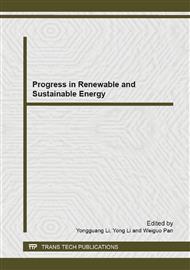p.553
p.560
p.564
p.569
p.573
p.579
p.584
p.588
p.592
Study on Reactive Power Compensation of Single Wind Farm
Abstract:
With the proportion of wind turbine generation system(WTGS) in power grid is highly increasing, which produces a great effect on the security and stability of the electric power network. Considering the current condition and characteristic of wind form, we built a simulation model in the imitative situation with different wind turbine outputs and different feeder types, obtained the reactive power loss of wind farm and key node voltage, as well as the ability of fixed compensation device. By using the reactive power generated from wind turbine, it can reduce capacity of the reactive compensation device in collection station, which realizes the balance of reactive power, increases the voltage stability.
Info:
Periodical:
Pages:
573-578
Citation:
Online since:
December 2012
Authors:
Price:
Сopyright:
© 2013 Trans Tech Publications Ltd. All Rights Reserved
Share:
Citation:


